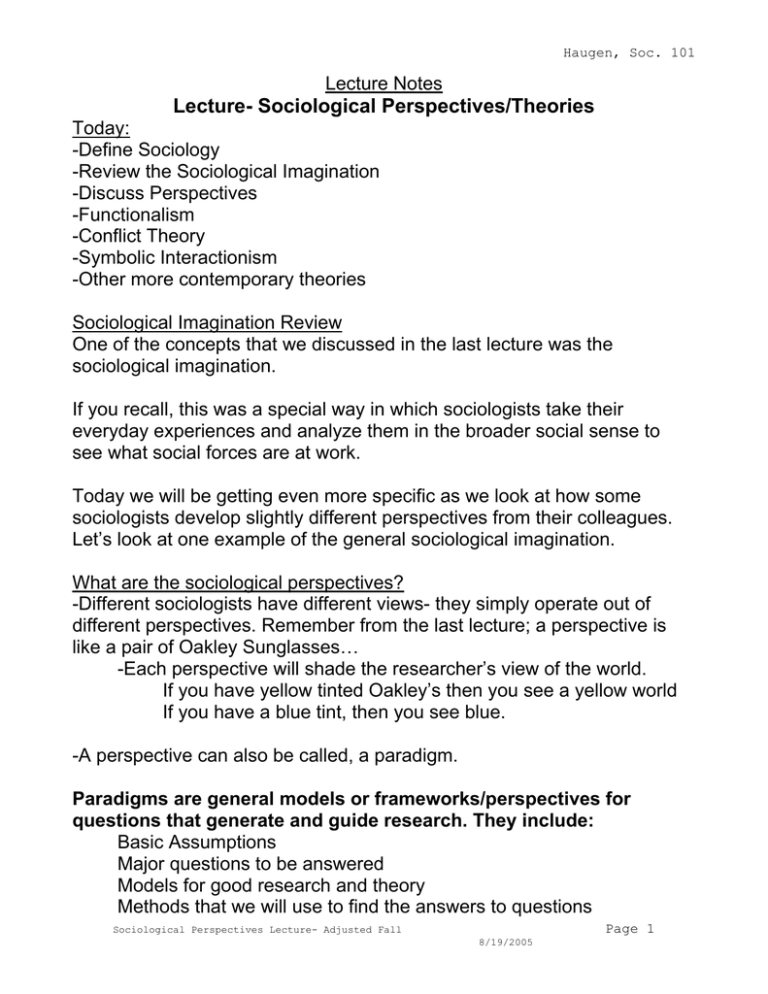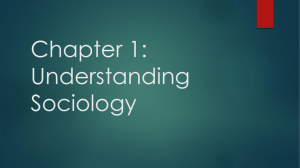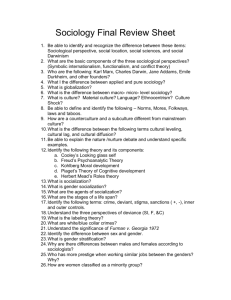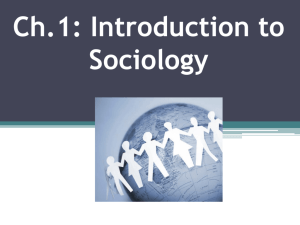Lecture- Sociological Perspectives/Theories
advertisement

Haugen, Soc. 101 Lecture Notes Lecture- Sociological Perspectives/Theories Today: -Define Sociology -Review the Sociological Imagination -Discuss Perspectives -Functionalism -Conflict Theory -Symbolic Interactionism -Other more contemporary theories Sociological Imagination Review One of the concepts that we discussed in the last lecture was the sociological imagination. If you recall, this was a special way in which sociologists take their everyday experiences and analyze them in the broader social sense to see what social forces are at work. Today we will be getting even more specific as we look at how some sociologists develop slightly different perspectives from their colleagues. Let’s look at one example of the general sociological imagination. What are the sociological perspectives? -Different sociologists have different views- they simply operate out of different perspectives. Remember from the last lecture; a perspective is like a pair of Oakley Sunglasses… -Each perspective will shade the researcher’s view of the world. If you have yellow tinted Oakley’s then you see a yellow world If you have a blue tint, then you see blue. -A perspective can also be called, a paradigm. Paradigms are general models or frameworks/perspectives for questions that generate and guide research. They include: Basic Assumptions Major questions to be answered Models for good research and theory Methods that we will use to find the answers to questions Page 1 Sociological Perspectives Lecture- Adjusted Fall 8/19/2005 Haugen, Soc. 101 • There are three major perspectives that were most widely used in much of classical sociology and still are accepted today in contemporary sociology: 1. Structural Functionalism (Functionalism) 2. Conflict Theory 3. Symbolic Interactionism Structural Functionalism- “Views society as a system of highly interrelated structures or parts that function or operate together harmoniously” -In this model/perspective, everything serves a purpose, it something ceases to serve a purpose, then it will cease to exist. -Structural Functionalism is viewed as a MACRO level theory because it deals with the larger structures of society. The macro institutions. -Functionalism argues that some of the primary structures that make up our society are: a. Government/Political b. Economy c. Education d. Family e. Religion -Functionalism was one of the very first perspectives to be developed in sociology. At the time, sociologists were trying to make sociology a recognized discipline, therefore they modeled themselves after biology. Saying that the functionalist model saw society as an organism. • Think of society as an human organism- (DRAW STICK FIGURE) and each of the body part of that human is one of our structures/institutions. -If you were to chop off any body part, the human organism would fail. -If you were to chop off any structure of society, the society would somehow suffer consequences. It would harm the harmonious functioning of the system. Page 2 Sociological Perspectives Lecture- Adjusted Fall 8/19/2005 Haugen, Soc. 101 -Functionalism is concerned with the structures that compose society, what makes up the structure, how it interacts with other structures and how the people that are in and come in contact with that structure act/relate. (Macro level approach). The theorists most associated with Functionalism: Robert Merton- (1950’s + 1960’s) -Social Functions, “social processes that contribute to the ongoing operation or maintenance of society” (p. 20). a. Manifest Functions Those “intended and recognized consequences” b. Latent Functions “Unintended or not readily recognized consequences” • So what does this mean? Let’s take the institution of education: -What are the manifest or intended functions of higher education? -Why do we say you are here in College? College has a mission statement Get a Degree Get Smart Get Money Better work Etc. -What are some of the latent functions of your college education? Meet friends Social stuff Meet lovers/BF/GF Stay on insurance Free rent Avoid working Make parents happy Therefore, as you can see, from the functionalist perspective- it is the social structures and institutions which are most studied. Page 3 Sociological Perspectives Lecture- Adjusted Fall 8/19/2005 Haugen, Soc. 101 Conflict theory “sees society as constantly changing in response to social inequality and social conflict”(p. 21). • Conflict theory was made most famous by Karl Marx who held firm beliefs that all history was rooted in the class struggles. Between those who have and those who have not. • Conflict theorists believe that society is guided by those dominant groups who hold power. • **Particularly they are interested in examining who benefits from particular social arrangements and how those in power maintain their positions and continue to reap benefits from them. • Therefore a conflict theorist would take situations such as factory workers, examine who controls the factory, who owns the means of production, which people benefit from the relationship, etc. They are concerned with people but at the macro level…they want to look at overall power structures, the struggle for resources and how conflict is managed in a society. An offshoot of Conflict theory which we will discuss in a moment is Feminism. A third major paradigm is that of Symbolic Interactionism. This perspective focuses on how individuals make sense of-or interpret the social work in which they participate. The focus here is on signs, gesture, shared rules, language, and our faceto-face interactions. Meaning is assigned through our interaction with one another. PEN • Because you and I come together to call this thing a “pen” we have given it meaning. Thus sociologists in this paradigm want to know just how we come to agree on the meaning, how we interact when face-to-face. Page 4 Sociological Perspectives Lecture- Adjusted Fall 8/19/2005 Haugen, Soc. 101 One of the more famous contemporary Interactionist theorists is Erving Goffman. Goffman has a theory of Dramaturgy His comparison is that society and our day to day interactions are just like a theatrical production. Life is a stage. Example- I come into this classroom, I am on stage, I use the props (like an actor) to show I am a professor, my pens, my bag, my rosters, I could really not be who I say I am if I can have good control of impression management. You have assigned me meaning as a professor because I play the part well, I have my bag, my pens, my video, etc. Thus, I have controlled your impression of me…. Feminism emerged out of a new focus with the conflict theory. While traditional conflict theory had focused on inequality based on economic resources, feminism originally was created to examine conflict and inequality based on those same economic resource battles, but focused on how women and the many disadvantages they faced Feminism- beliefs and actions that attempt to bring justice, fairness, and equity to all women, regardless of their race, age, class, sexual orientation, or other characteristics. Recently, it has been expanded from just women but to all “PEOPLE” Feminism has gotten a bad wrap for some time, many people felt that feminists were radical lesbians only. This is simply not the case, many men are feminists, many people may even believe in feminism and not even know it, because they have assumed that “feminism” was something very different. Page 5 Sociological Perspectives Lecture- Adjusted Fall 8/19/2005





